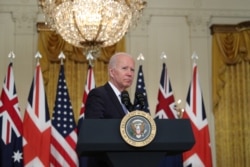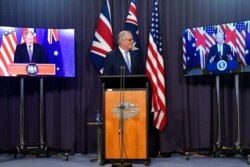Australia has signed a new security partnership with the United States and Britain to share defense technologies in what analyst say is an effort to counter the potential threat from China.
British officials have stressed that the pact was not a response to one country, but analysts believe it is an unmistakable sign of concern about China’s military ambitions in the Indo-Pacific region. They have said it has highlighted the strategic importance of the region to both the United States and Britain.
The new pact was announced Wednesday during a virtual joint statement President Joe Biden made along with Australian Prime Minister Scott Morrison and British Prime Minister Boris Johnson.
President Biden praised the partnership.
"We need to be able to address both the current strategic environment in the region and how it may evolve. Because the future of each of our nations, and indeed the world, depends on a free and open Indo-Pacific enduring and flourishing in the decades ahead.”
In the joint statement, the leaders said there were several potential issues of concern, including territorial disputes, terrorism and organized crime.
Analysts said the deal was significant because it allows Australia to build nuclear-powered submarines for the first time. The government in Canberra has insisted the submarines would not carry nuclear weapons.
The alliance — known by its acronym, “AUKUS” — will also cover artificial intelligence, quantum technologies and cyber defenses. Johnson said the three nations were “natural allies.” Morrison said the pact would boost regional security.
“The future of the Indo-Pacific will impact all our futures. To meet these challenges, to help deliver the security and stability our region needs, we must now take our partnership to a new level. A partnership that seeks to engage, not to exclude, to contribute, not take, and to enable and empower, not to control or coerce. And, so, friends AUKUS is born,” he said.
However, Australia’s news reports suggest the scrapping of a multi-billion-dollar submarine defense deal with France will cause immense diplomatic tensions between the two nations. The deal, the Australian government says, will be scrapped because of Australia’s plans to build nuclear-powered submarines under the AUKUS security pact with the United States and Britain.
For decades, Australia has sought security with defense and intelligence pacts.
The “ANZUS,” another security treaty between the U.S., Australia and New Zealand, recently celebrated its 70th anniversary. Australia is also an active member of the Five Eyes alliance, which includes the U.S., Britain, Canada and New Zealand. The Five Eyes alliance was created to monitor the Soviet Union after the Second World War.
Australian officials have said the nuclear-powered submarines would be service in the mid to late 2030s.
Adam Bandt, leader of the Greens, a minor left-of-Center party, said on Twitter that the move was “dangerous” and would put “floating Chernobyls in the heart of Australia’s cities,” referring to a nuclear energy accident at the Chernobyl Nuclear Power Plant in Ukraine in 1986.






